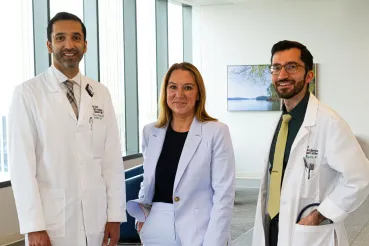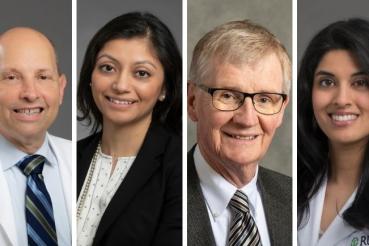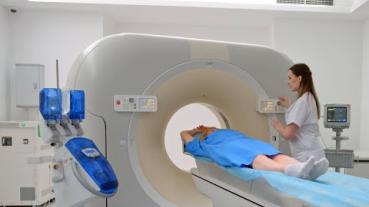The novel coronavirus pandemic has shined a light on a health care profession whose work had often gone unnoticed but whose precise, highly skilled care is as crucial as a patient’s next breath.
“Hospitals all over the United States are in need of highly qualified respiratory therapists,” said J. Brady Scott, MSc, RRT, a respiratory therapist and an associate professor of respiratory care at Rush University. “Now because of the nature of the COVID-19 disease and the unique skillset we have, this need has never been so visible, but in reality, it existed even before.”
Already, in the few months since the pandemic reached the U.S., Rush University’s College of Health Sciences has seen greater interest in the Respiratory Care master’s degree program. In fact, the number of students who have committed to starting in the fall is up 8 percent from the same time a year ago. Even more noticeably, prospective students are more aware of what respiratory care is and what respiratory therapists do.
COVID-19, the disease caused by the SARS-CoV-2 virus, can attack the lungs and cause a harrowing, life-threatening struggle to breathe. With the sudden, extraordinarily high need for ventilators, state and local governments scrambled to obtain them. Yet, the patient who needs a ventilator, needs a respiratory therapist to manage it or whichever tools and treatments are needed.
“The respiratory therapist has the unique skillset to operate the complex mechanical ventilators and the other equipment we use,” Scott said. “Beyond equipment, their skills in patient assessment and critical thinking are crucial to the survival of these very ill patients.”
The therapists provide several types of treatments that require expert training and a deep understanding of how the patient is responding at all times and what the next steps should be. Rush University Medical Center is using innovative solutions to reduce the need to intubate a patient, such as placing patients in a prone position, that is face-down on the bed, to increase oxygen levels and reduce the need for a ventilator. Rush respiratory therapist and associate professor Jie Li, PhD, RRT, is leading a clinical trial on the early use of prone positioning with high-flow nasal cannula for COVID-19 patients.
“We aren’t people who wheel in vents and walk away,” said Laurel Stewart, who is in her final semester of Rush’s respiratory care master’s program. “We use the vent to give the patient exactly what respiratory support they need, no more and no less. It is very precise.”
Two years ago, Stewart wouldn’t have known that. Having just earned a bachelor's degree in microbiology and infectious disease from the University of Wisconsin-Madison, she wasn’t interested in respiratory therapy and knew almost nothing about the field.
That changed when she spoke with David Vines, PhD, MHS, RRT, director of the respiratory care master’s degree program at Rush. He explained the opportunities, the type of work and study involved and his own passion for his career. The university is fully integrated with Rush University System for Health. Under Rush’s innovative practitioner-teacher model, Vines and the faculty are practitioners, researchers and educators.
“The Rush program creates leaders in the field who can advance the profession and improve patient care,” Vines said.
Respiratory therapists are critical members of the health care team who care for patients, newborns through the elderly, to prevent, identify and treat acute or chronic cardiopulmonary conditions, such as COPD. The field draws on both knowledge of how the body works (physiology) and the use of technology.
“We get to help people breathe, to help them survive serious disease,” Scott said.
Stewart and a handful of her classmates learned this first-hand by helping out in the medical center during the pandemic, supporting respiratory therapists, including some of her professors.
The College of Health Sciences offers the only master’s degree respiratory care program in Illinois and one of only a handful in the nation. It offers outstanding leadership and advanced practice preparation in critical care, neonatal care and cardiopulmonary diagnostics and more. The low student-to-faculty ratio ensures individualized attention.
Currently, 23 students are in the program. With the current attention to the vital role respiratory care plays, Vines said he already is seeing more interest from prospective students and they clearly know more about the field.
Applications for admission to program in Fall 2020 are accepted through August. Previous health care experience is not required.
Upon graduation from the 24-month accredited program, students are eligible to take the advanced examinations for registered respiratory therapists given by the National Board for Respiratory Care (NBRC).
The opportunities in respiratory care only continue to grow. The U.S. Bureau of Labor Statistics estimates that employment opportunities for respiratory therapists will grow 19 percent through 2022.
"I tell students that I have never regretted my decision to become a respiratory therapist, that it is a privilege to help someone survive a severe illness,” Scott said. “I share with them the opportunities for collaboration with colleagues, for being a lifelong learner, and the overall feeling that you are making a difference in society.”




